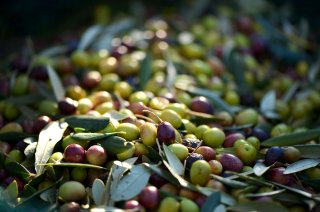
Olive3P
Innovative sustainable food system for olive oil production converting solid and liquid by-products into edible yeast and biopesticide
Project coordinator:
Dr. Imene Chentir, École Supérieure des Sciences de l'Aliment et des Industries Agroalimentaires (ESSAIA), Algeria
Partner countries: Morocco, Turkey
Scientific abstract
The Olive3P project aims at transforming conventional olive oil production into an integrated innovative food system through treatment of solid by-products along with treatment of olive mill effluents combined with the recovery of novel products comprising activated carbon, edible yeast, and biocontrol agents containing polyphenols.
Biochar obtained from carbonisation of solid residues (branches from olive harvest, olive stone from the milling process), will undergo physicochemical activation. Biochar and activated carbon will be applied as adsorbent for polyphenols capture from olive mill effluent and recovered as a natural biocontrol agent with biocidal activity. Polyphenols will be extracted from biochar and activated carbon by conventional and supercritical CO2 extraction using green solvents and tested as biopreservative in table olive conservation, whereas adsorbents (activated carbon or biochar) containing residual polyphenols will be applied as soil conditioner, and their biopesticide potential on soil-borne pathogens of olive seedlings will be evaluated.
Treated olive mill effluents with reduced concentrations of inhibitory polyphenols will be applied for efficient cultivation of edible yeast, adding cheese whey as a low-cost nitrogen source for optimal yeast growth. Harvested edible yeasts will be evaluated as health-promoting animal feed rich in carotenoids with potential application in poultry and fish production.
Lab scale results will be transferred at a pilot scale by the participating Turkish company in view of future commercial exploitation. The evaluation of the innovative system in Food Systems Approach (FSA) will be applied on following drivers: (1) Healthy diet: Quality and safety of edible yeast and biocontrol agent, (2) Cost and revenues: Socio-economic feasibility of the innovative food system for small 3-phase olive oil factories, and relation to current sustainable practices, (3) Food security: Resource-efficiency evaluated by mass/energy balance and Life Cycle Analysis, compared with current practices.
Keywords: Olive oil sector, olive mill effluent, valorization of by-products, biochar, edible yeast
This project is funded by the 2021 joint call of FOSC and SUSFOOD2.
Partners
Cadi Ayyad University, Marrakech, Morocco
University of Sultan Moulay Slimane, Beni Mellal, Morocco
Olive Research Institute, Izmir, Turkey
Düzen, Ankara, Turkey
